[X.com] by @InternetH0F
Never forget Anne Hathaway beating Kelly Clarkson with her own song 😂 https://t.co/NUeeqr2F0u
Never forget Anne Hathaway beating Kelly Clarkson with her own song 😂 https://t.co/NUeeqr2F0u
Babies naturally learn by imitating their parents, and sometimes their mimicry can be absolutely hilarious. https://t.co/lQY3koP9Jj
A farmer couldn't attend his aunt’s funeral, so he put out heart-shaped food for his sheep so that "she could see it from heaven." https://t.co/cztTLABbmq
Wife asked our 13 year old to carry something upstairs for her
He said his legs were sore from his football game
She asked “Why are your legs sore? When you ran the ball you got tackled for a loss, you didn’t run anywhere. You went backwards”
Tough in this house
oh my god the way they teased out a causal effect lmaoooooo
"we exploit idiosyncratic variation in the extent of gender balance in fathers’ workplaces. Fathers who encounter more women in their relevant age–occupation–group at work are more likely to divorce."
Quoted Tweet:
Just published in @JPubEcon: "How does parental divorce affect children’s long-term outcomes?" By @WFrimmel (@jku_econ), @HallaMartin (@WU_econ), @EbmerWinter (@IHS_Vienna) https://t.co/gpesU9mXMn https://t.co/PRi6Jzdp0q
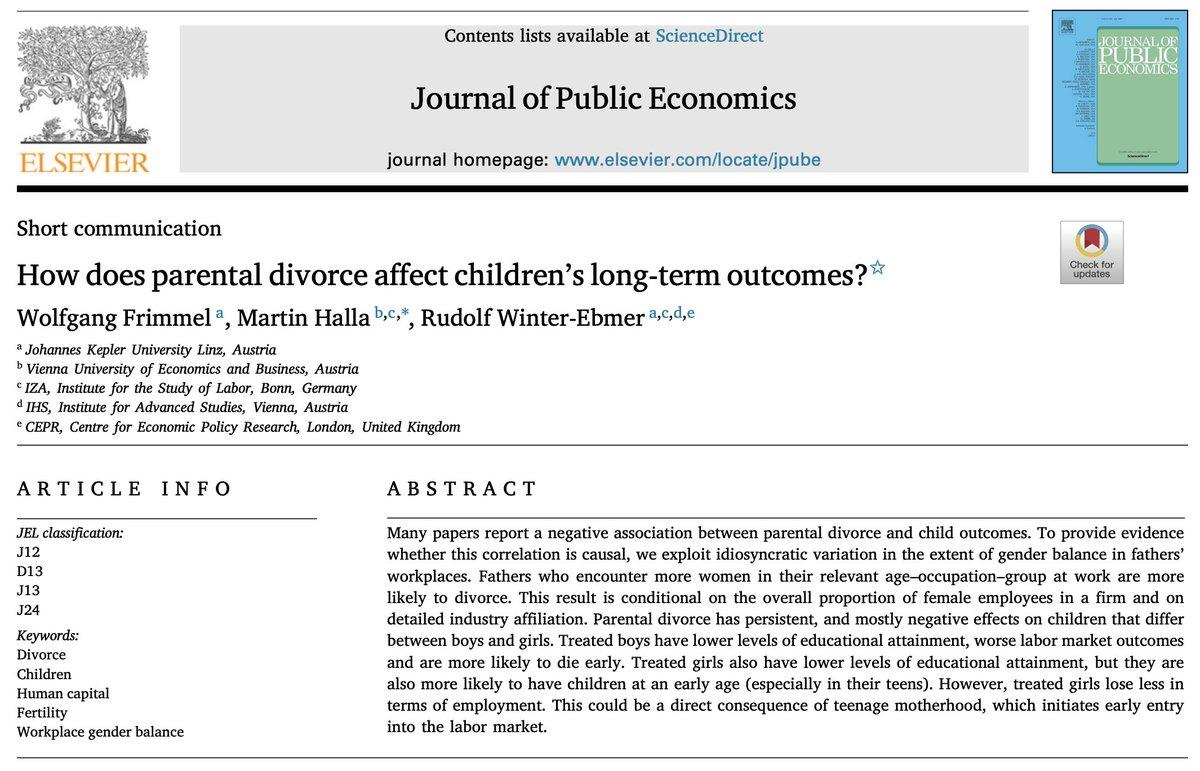
These grandkids planned to surprise their grandma at the airport dressing as t-rex but she heard about it and planned her own surprise. https://t.co/moVLVzbjuZ
This is a rescued baby otter named Joey and he loves ice. I am crying https://t.co/RmAT7UotQd
Guys the polls that bounce around a lot are much more honest than those where every survey shows a tie or +1, which are likely doing a significant amount of herding.
Somehow the Russians and the MAGA people always end up saying the exact same lies
Quoted Tweet:
Newly Exposed Russian Disinfo Sites Echoed GOP’s False Narratives About Non-Citizen Voting https://t.co/ovMD0ouD94 via @TPM
The Japanese girl studying English is so funny that I can't help but laugh along with her.🤣🤣🤣 https://t.co/dx9AmdAm6V
When you don't know what you're doing but ur happy to be involved https://t.co/ZcnUnARlTD
just learned about the “80s Hong Kong pre-wedding” photography style that’s supposed to emphasize the authenticity and rawness of marriage. i’m kinda obsessed with this https://t.co/U39PacZcSb

"poor people who go to services several times a week are happier than rich people who never go...attending services has a bigger impact on your happiness than wealth. Money buys a fair bit of happiness but connection gives you more bang for the buck" https://t.co/aUjbN4EJ7K https://t.co/4NXT4xVBvo
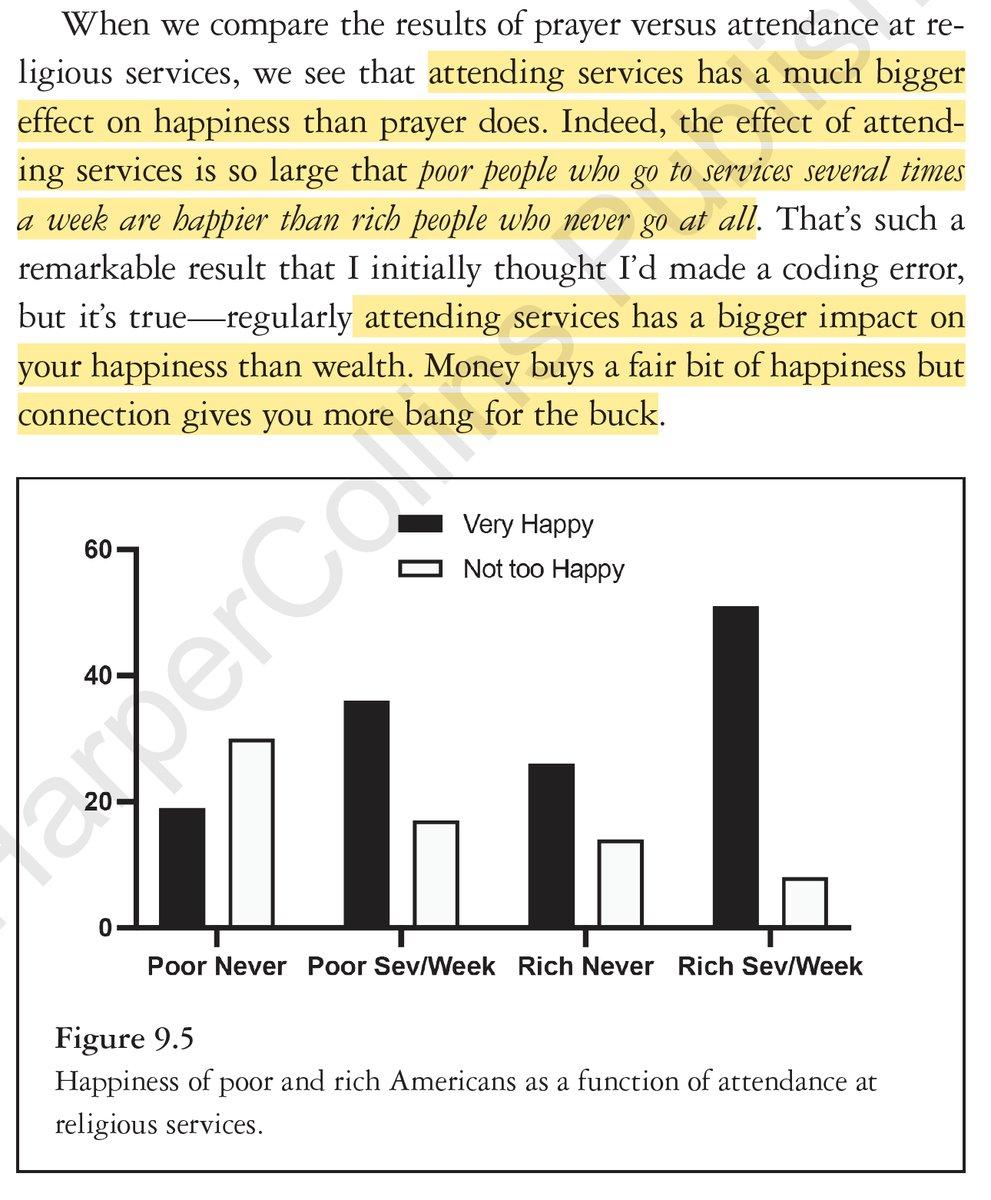
Elephant carefully tests the electric fence before removing it.. https://t.co/HVF4qOqn8f
This is a wonderful piece by William Comanor which shows how esoteric methodological debates can have huge effects when politicians delegate to experts. In this case, bad methods make poor dads pay more than is warranted for child support. Short 🧵https://t.co/WBwHGeAXV1
I figured out who taught Kamala how to pose during the debate! It was Deb! https://t.co/87BmsCA73r
The gender wage gap is mostly occupational sorting, hence feminists invented comparable worth. Alas, comparable worth requires the state to have godlike omniscience about human capital and compensating differentials. Result: a microcosm of the socialist calculation problem.
Quoted Tweet:
Jesus this is beyond idiotic: https://t.co/81PJ1i2Y6a https://t.co/MAM2cVzCfk
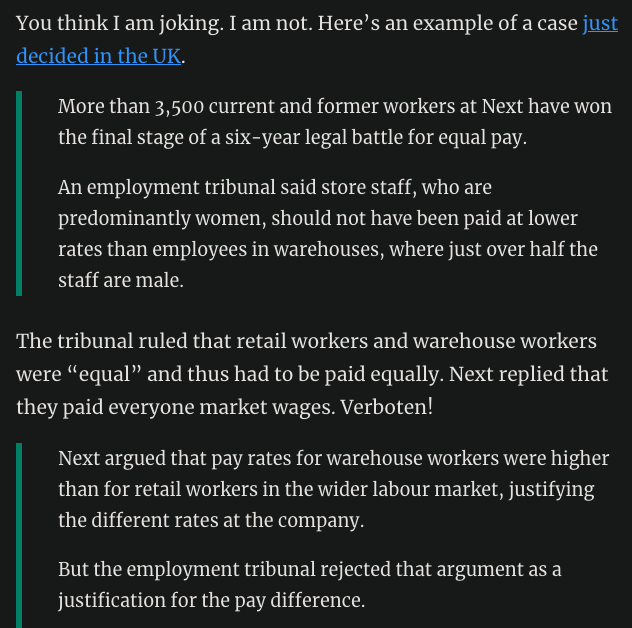
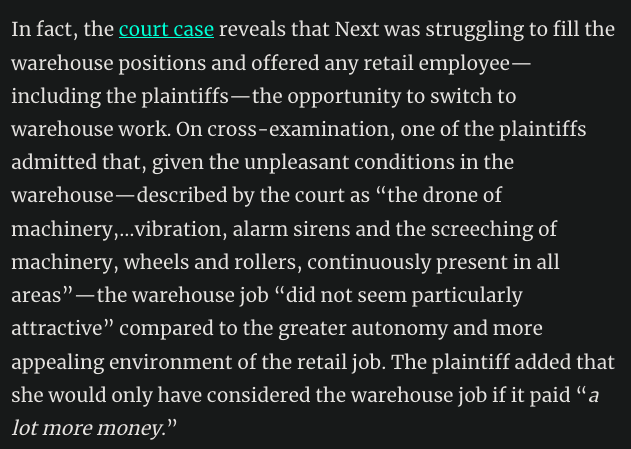
These videos are killing me. I got tears running down my face I’m laughing so hard 😂 https://t.co/QBWoKwDXWi
These data are really damning. Hard to think of another plausible explanation other than actual physical immaturity is being medicated.
Quoted Tweet:
"The graph below shows a worrying trend: The youngest kids in class are more likely to be treated for ADHD. This suggests that immaturity is sometimes being mistaken for mental illness, and that some kids are being unnecessarily medicated." https://t.co/zyk4QahinC https://t.co/BcMbsx8ZFU
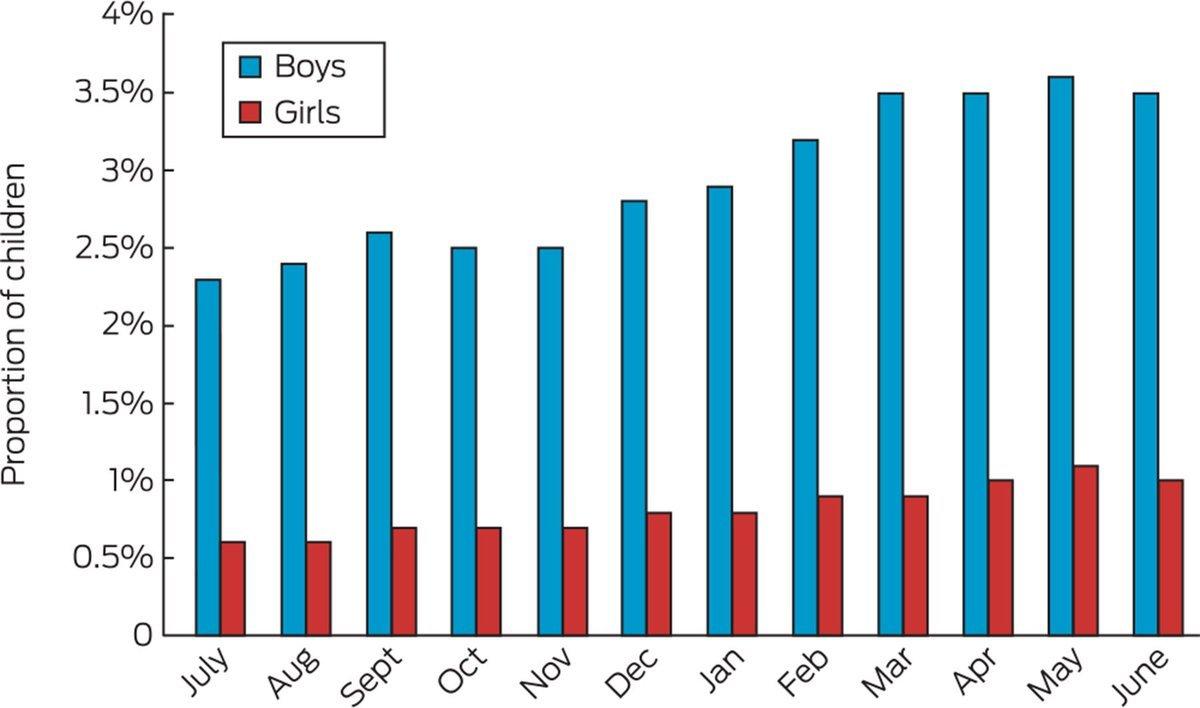
Interesting!
Quoted Tweet:
"while men are nearly 18 percent faster than women in 5K races, they are only 11 percent faster in marathons, 3.7 percent faster at 50 miles, roughly even as they approach 100 miles, and then women routinely outpace men at races 195 miles and up" https://t.co/oTtbFWfsUa https://t.co/XxmX1bthik

Imagine running for your life and this is the fastest you can go https://t.co/1E6nH9ADHI
Tourists who wanted to cross the glass-bottomed bridge could not convince their dogs. 😂😂
"So it's 1453, I'm in Constantinople, and I open the North gate of the city-" https://t.co/VeoSxPLgHV

An epic thunderstorm in Guatemala began simultaneously with the eruption of Mount Fuego
Footage taken by eyewitnesses shows lightning striking directly into the mouth of the volcano. https://t.co/FBDkPjoAWo
Here's an ungated link to the paper:
Quoted Tweet:
@cremieuxrecueil Thanks for reading and sharing my research @cremieuxrecueil. Here’s an ungated link to the paper: https://t.co/AC9O1G8RcF
Builder's remedy!
Quoted Tweet:
24-story apartment tower pitched for 601 Colorado Ave. in Santa Monica https://t.co/wJnR1oICSh https://t.co/w7sdvTRDqv




Picked up a used copy of 19th century novelist Anthony Trollope’s autobiography today. He worked at a post office for his day job and devoted his spare moments to writing. His self-imposed rules for productivity: https://t.co/8MjoBpzHKd

"I'm autistic."
"Does that mean you take things literally?"
"No, you're thinking of kleptomaniacs."
Michael Mauboussin is a researcher at Morgan Stanley, was Chairman of the Santa Fe Institute, and writes about finance and investing.
He's a master at turning complex ideas into strikingly simple writing.
Here are 12 lessons on writing taken from our conversation:
The great gift of writing is it reveals how much you don’t know. You’re forced to rethink your arguments and go back to first principles.
Have something to say. Having a great style counts for nothing unless you have something worth sharing with the world.
The main lesson from Michael: Writing is about understanding. You write to broaden your understanding, and in turn, help others do the same. You write to get your arms around an issue.
How written communication is harder than verbal: in a conversation, you get feedback from the other person’s face. You can switch tracks midway if they look confused. In writing, you need to predict what might be confusing and deal with it beforehand.
How to develop a style: Find language that resonates with you. Read newspapers, tweets, new bestsellers and old books. Pay attention to words that pop out, or phrases that echo in your memory long after you're done reading them.
It's time to write when there's a gap between how much you know and how much you want to know. Find your knowledge-curiosity gaps, and you’ll have more essay topics than you can handle.
Charlie Munger said to be a good thinker, you have to jump disciplinary boundaries. One way to do this is to read widely. If you don’t, your work will be swamped with cliches.
Examine the intellectual history of words. Error and mistake, for example, are not synonyms. Luck and fortune do not mean the same things. Your word usage will dramatically improve once you know their historical background.
If Michael is learning a lot without teaching much, he feels out of balance. If he’s teaching a lot without learning new things, he feels out of whack again. The takeaway of the previous point: learn a lot… then share it with others. Write about it. Teach it. Sync the input and the output.
A great quote from mathematician Carl Gauss: “Not notations, but notions.” Math is full of complex notations but what matters more are the notions, the ideas, behind them. Writing is no different. Figure out the important underlying idea you want to share, and make it straightforward and accessible.
Great teachers are great learners. They’re not just trying to pass on their body of knowledge…they’re constantly looking to expand it.
If innovative thinking relies on combining building blocks in novel ways, then reading is the primary source of the blocks.
I've shared the full conversation with @mjmauboussin here.
If you'd rather listen on YouTube, Spotify, or Apple, check out the replies in the following tweets.
Everyone knows that alcoholism is bad. Drink too much, you'll fry your brain, or so the wisdom goes.
But it's also common knowledge that a little bit of alcohol is good for you. I mean, just take the conventional epidemiological result:
Clearly people who used to drink and people who never drink do worse than the people who drink a bit. And when people start drinking even more than a bit, they look a little better. Beyond that, they start to look a bit worse, but at no point are they worse than the non-drinkers.
Right?
The problem with the conventional analysis is that selection is at play. The people who don't drink at all and the ex-drinkers are selected into not drinking in weird ways. For example, an ex-drinker might be someone who was a heavy drinker in the past; a never-drinker might be a socially odd person. Who knows! But the potential that they're not normal is very much there.
It would be unethical to run human experiments to figure out what alcohol does, so, how can we know what alcohol does to health?
With a clever little method called Mendelian Randomization, or MR. MR is basically an answer to the question What if I used genes as instrumental variables?
Using Chinese data and genes that affect alcohol metabolism, that's exactly what Millwood et al. did! Since the alcohol metabolism genotypes they used should be otherwise independent of risk, everything should be good to go for using these as predictors of alcohol's effects.
But just to be sure: one of the ways we know these genotypes don't have independent effects is that there were no effects in women, who, for cultural reasons, are pretty close to being non-drinkers. Just take a look at the male-female difference in drinking!
So putting this wonderful genetic predictor to use, we can finally see what alcohol actually does.
Well, the effect of the unconfounded difference in alcohol consumption is that, when it comes to heart health, alcohol doesn't seem to do much, rather than being a bit protective.
But the heart isn't everything. There's certainly more!
Alcohol did increase risk for ischemic stroke, intracerebral hemorrhage, and total strokes.
Not only that, but in another study using a similar method, alcohol increased hypertension, blood pressure, waist circumference, waist-to-hip ratio, fasting blood glucose, and triglycerides. But, consistent with these results, in that paper it didn't seem to have a significant effect on cardiovascular disease or coronary heart disease, and it both increased HDL and decreased LDL.
In aggregate, alcohol is likely to be bad for your health at any level, but selection into disuse means the downsides have been hidden in traditional analyses. And even if alcohol doesn't negatively impact heart health on its own, the fact that it's not protective and it increases other risks means it's risky on net.
Sources:
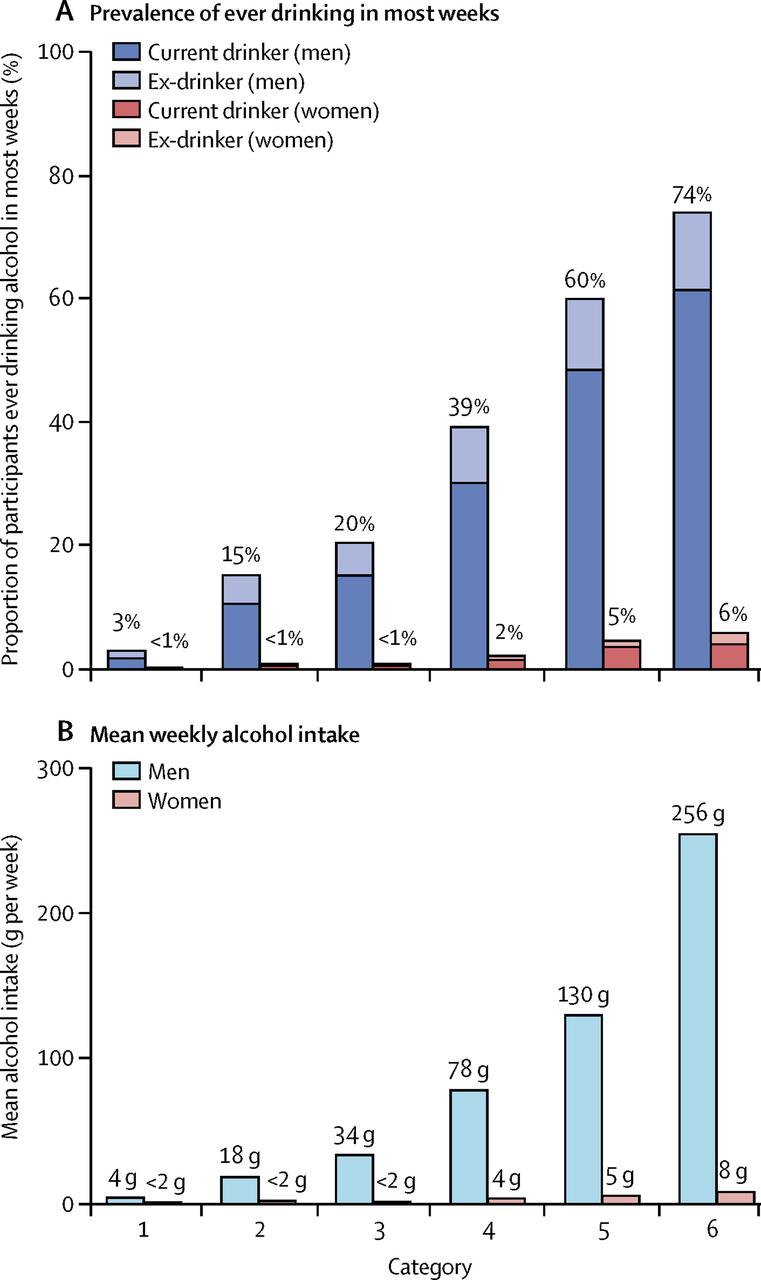
Emily Oster had this insight back in 2020.
She exploited the fact that a NEJM piece published in 1993 showed vitamin E had major health benefits and another article published in 2004 showed that vitamin E's benefits were overstated and it might actually be harmful.
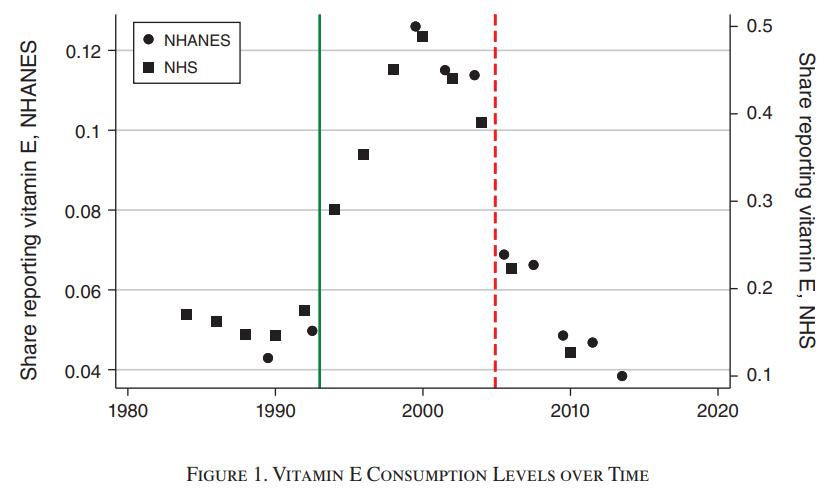
Quoted Tweet:
SIDS and breastfeeding are great examples of knowledge dispersal influencing correlations. In the past, these phenomena were less related to class/edu, but as it became "common knowledge" that certain things prevent SIDS or that breastfeeding is good, class correlations grew. https://t.co/PR1nWoO3W3

Some people really benefit from hearing advice that everyone knows, for the same reason we keep schools open despite every subject in them having been taught before.
In that spirit, here's some quick Things Many People Find Too Obvious To Have Told You Already.